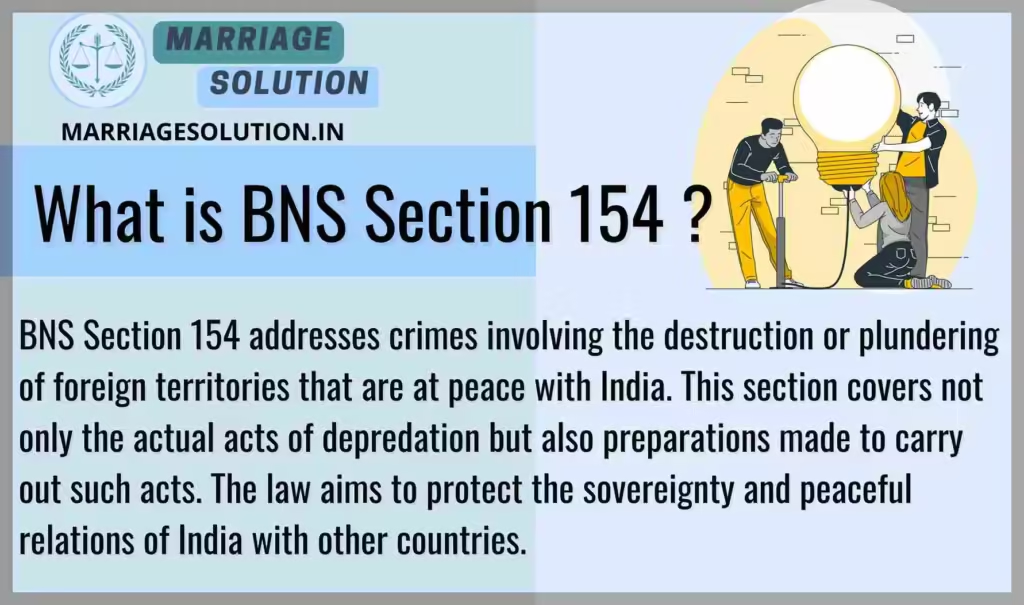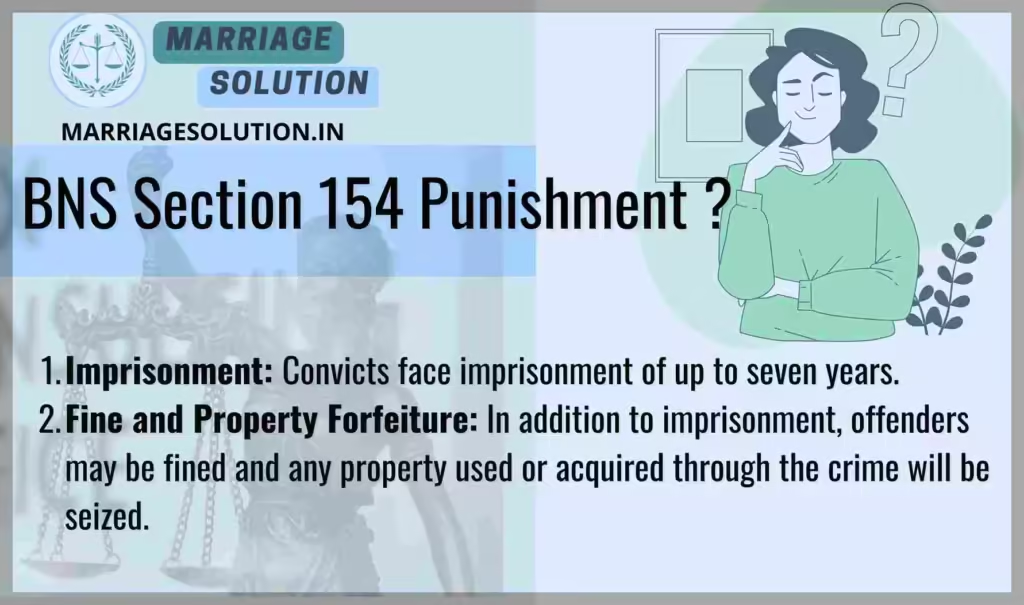Introduction of Section 154 BNS
Section 154 BNS deals with the offense of committing depredation—that is, destruction, looting, or plundering—on the territories of foreign states that are at peace with India. This provision covers not only the actual acts but also preparations made for such actions, making it a comprehensive safeguard against hostile activities. The law reflects India’s responsibility as a peace-respecting nation by ensuring that no individual or group can harm international relations. With punishments including imprisonment up to 7 years, fines, and forfeiture of property, this section protects both India’s diplomatic image and its commitment to international peace.
The Bharatiya Nyaya Sanhita (BNS) Section 154 replaces the old Indian Penal Code (IPC) Section 126.
What is BNS Section 154 ?
BNS Section 154 addresses crimes involving the destruction or plundering of foreign territories that are at peace with India. This section covers not only the actual acts of depredation but also preparations made to carry out such acts. The law aims to protect the sovereignty and peaceful relations of India with other countries.

Section 154 BNS explanation
Whoever commits depredation, or makes preparation to commit depredation, on the territories of any foreign State at peace with the Government of India, shall be punished with imprisonment of either description for a term which may extend to seven years, and shall also be liable to fine; and any property used or acquired in such depredation shall be forfeited.
Explanation of Section 154
Section 154 of the Bharatiya Nyaya Sanhita (BNS) criminalizes depredation (acts of destruction, looting, or plundering) against the territories of foreign states that are at peace with India. It covers both the actual act of depredation and preparations made for such acts, highlighting India’s commitment to maintaining peaceful international relations.
This section ensures that individuals or groups do not, by their hostile actions, drag India into conflicts with friendly nations.
- Scope → Applies to actual depredation and preparations for depredation.
- Purpose → To protect India’s global image and foreign policy by preventing hostile acts against friendly states.
- Punishment → Up to 7 years imprisonment + fine + forfeiture of property used or gained.
- Classification:
- Cognizable → Police can arrest without warrant.
- Non-bailable → Bail is not automatic.
- Non-compoundable → Cannot be privately settled.
- Tried by Court of Session → Serious crime, heard in higher courts.
Key Elements of Section 154
- Depredation Defined → Includes plundering, looting, destruction, or violent attacks on property or people of a friendly foreign state.
- Preparations Covered → Planning, gathering weapons, or organizing for such acts is punishable even if the act isn’t carried out.
- Imprisonment → Up to 7 years of imprisonment for offenders.
- Fines → Courts may impose monetary fines as additional punishment.
- Forfeiture of Property → Any tools, vehicles, weapons, or gains connected to the crime will be confiscated.
- Cognizable Offense → Allows immediate police intervention.
- Non-Bailable → Reflects the seriousness of the offense.
- Non-Compoundable → The case cannot be settled privately.
- Trial by Court of Session → Given its international impact, only higher courts can hear such matters.
- International Peace → Aims to maintain friendly and lawful relations with other nations.
Examples of BNS Section 154
Example 1 – Actual Depredation:
A group of individuals crosses into the territory of a foreign state at peace with India and plunders property.
They are guilty under Section 154 and may face imprisonment + fine + forfeiture of their property.
Example 2 – Preparation for Depredation:
An individual stocks weapons and arranges boats to attack coastal property of a friendly foreign state. Even if the attack never happens, the preparation itself is punishable.
They are guilty under Section 154 for preparation.
Why Section 154 is Important
- Protects India’s reputation as a peaceful nation.
- Prevents individuals from creating international disputes.
- Deters both direct action and preparation for hostile acts.
- Ensures offenders lose not just their freedom but also any property linked to the crime.
Section 154 BNS Overview
BNS Section 154 deals with crimes involving destruction or plundering in foreign territories that are at peace with India. It addresses both the act and preparation for such crimes, with penalties including imprisonment, fines, and property forfeiture. The crime is serious, non-bailable, and non-compoundable, and is tried in a Court of Session due to its gravity.
Detailed Explanation of BNS Section 154
BNS Section 154: Committing Depredation on Territories of Foreign States at Peace with India
1. Definition of the Offense
BNS Section 154 defines the crime of committing or preparing to commit depredation (acts of destruction or plundering) on the territories of foreign states that maintain peaceful relations with India. This section aims to prevent and penalize such hostile actions that threaten international peace and relations.
2. Scope of the Act
The section covers both the actual act of depredation and the preparation for it. This means that not only is the act of destruction or plundering punishable, but also the planning and organization of such acts are considered criminal.
3. Examples of Offenses
- Example 1: If a group plans and carries out an attack on property in a foreign country that is friendly with India, they are committing an offense under this section.
- Example 2: If an individual gathers resources and arranges for an attack on a foreign state’s territory at peace with India, even if the attack hasn’t occurred yet, they are still committing an offense.
4. Imprisonment Penalty
Those convicted under this section can face imprisonment of up to seven years. This term reflects the seriousness of the crime, considering its potential impact on international relations and peace.
5. Fines Imposed
In addition to imprisonment, offenders may be subject to fines. The amount of the fine is determined by the court and serves as an additional deterrent against committing such crimes.
6. Forfeiture of Property
Any property used in the commission of the crime, or obtained through it, will be forfeited. This includes equipment used to carry out the depredation or any gains from the crime.
7. Cognizable Nature
This crime is classified as cognizable, meaning that the police have the authority to arrest the accused without a warrant. This allows for immediate action to prevent further offenses and ensure that justice is served.
8. Non-Bailable Status
BNS Section 154 is a non-bailable offense, meaning that individuals accused under this section cannot easily obtain bail. This reflects the severity of the crime and the need for thorough judicial proceedings.
9. Non-Compoundable Offense
The crime is non-compoundable, indicating that it cannot be settled through a private agreement between the accused and the victim. Legal proceedings must be pursued to address the crime.
10. Court of Session
Cases under BNS Section 154 are tried in the Court of Session. This is because the offense involves significant implications for international relations and requires a higher level of judicial scrutiny.
BNS 154 Punishment
- Imprisonment: Convicts face imprisonment of up to seven years.
- Fine and Property Forfeiture: In addition to imprisonment, offenders may be fined and any property used or acquired through the crime will be seized.

BNS 154 bailable or not ?
No, BNS Section 154 is non-bailable. This means that individuals accused under this section cannot easily get bail and must face a formal trial.
Comparison Table – BNS Section 154 vs IPC Section 126
| Section | What it Means | Punishment | Bail | Cognizable? | Trial By |
|---|---|---|---|---|---|
| BNS Section 154 | BNS 154 deals with acts of waging war or attempting to wage war against the Government of India by persons within India. It includes preparation, conspiracy, or participation in warlike acts against the nation. | Death or imprisonment for life, and also liable to fine. | Non-Bailable | Cognizable (Police can arrest without warrant) | Court of Session |
| IPC Section 126 (Old) | The earlier IPC provision penalized committing depredation or attacking territories of allies of India, or supporting hostilities against friendly states. | Imprisonment for life, or imprisonment up to 7 years, and fine or forfeiture of property. | Non-Bailable | Cognizable | Court of Session |
BNS Section 154 FAQs
What does BNS Section 154 cover?
It addresses crimes related to depredation, such as destruction or plundering, in territories of foreign states that are at peace with India. It also includes preparing for such crimes.
What are the punishments under BNS Section 154?
Convicts may face imprisonment for up to seven years, fines, and forfeiture of any property used in or acquired through the crime.
Is BNS 154 offense bailable?
No, it is a non-bailable offense, meaning the accused cannot easily be released on bail.
What court handles cases under BNS Section 154?
Cases are tried in the Court of Session due to the seriousness of the offense.
Conclusion
Section 154 of the BNS plays a vital role in ensuring that India remains a responsible member of the international community. By criminalizing depredation and its preparations against territories of foreign states at peace with India, it prevents individuals from endangering diplomatic ties or disturbing global harmony. The strict classification of this offense as cognizable, non-bailable, and non-compoundable shows the seriousness with which India views such acts. Ultimately, this section strengthens India’s image as a nation that values peaceful coexistence, lawful conduct, and respect for friendly nations.
Need Legal Support?
If you’re facing court proceedings, marriage-related issues, or any legal matter, our team at Marriage Solution – Lawyer Help is ready to guide you. Just complete our easy online enquiry form, and we’ll connect you with the right legal assistance tailored to your needs.
Finished with BNS 154 ? Continue exploring the next provisions of the Bharatiya Nyaya Sanhita (BNS), 2023. Each section includes explanations, examples, and plain-language breakdowns for easy understanding.
- BNS 155 : Receiving property taken by war or depredation mentioned in sections 153 and 154 .
- https://marriagesolution.in/bns_section/bns-155/
- Section 156 BNS : Committing depredation on territories of foreign State at peace with the Government of India.
- https://marriagesolution.in/bns_section/section-156-bns/
- 157 BNS : Public servant negligently suffering such prisoner to escape.
- https://marriagesolution.in/bns_section/157-bns/
- 158 BNS : Aiding escape of, rescuing or harbouring such prisoner.
- https://marriagesolution.in/bns_section/158-bns/
Full IPC Section List: https://marriagesolution.in/ipc-section-list
All Indian Law & Blogs: https://marriagesolution.in/indian-law/
Full BNSS Section List: https://marriagesolution.in/bnss_section-list
